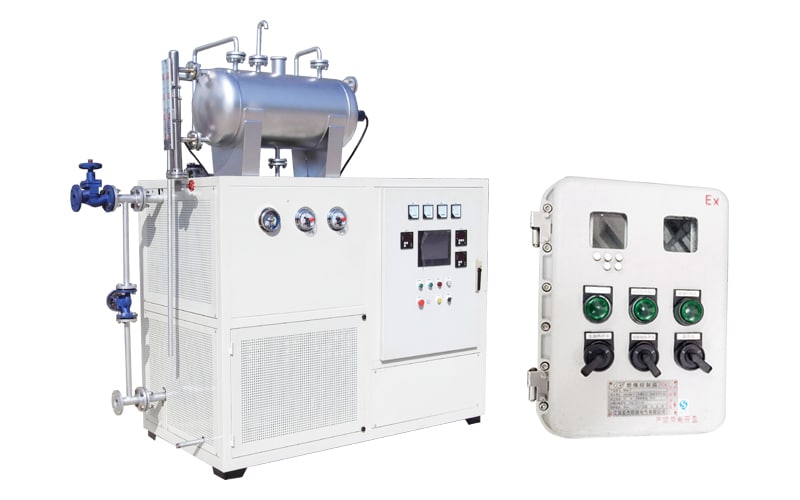Электрические термомасляные обогреватели https://8ruiyan.com/en/all-organic-heat-carrier-boilers/ are widely used in industrial production due to their uniform heating and precise temperature control. However, their operational safety, especially during sudden power outages, is often overlooked. An unexpected power failure, if not handled properly, can lead to severe fires or even explosions within minutes. This article analyzes causes and prevention of fires in Electric Thermal Oil Heaters During Power outages.

1. Why Do Power Outages Cause Fires? Key Reasons
A common misconception is that when the power goes out, the electric heater stops working, and the system becomes safe. In reality, the danger lies in the stagnation of high-temperature thermal oil. Here are the main reasons:
- Circulation Pump Stops, Causing Oil Stagnation
When the power fails, the circulation pump stops immediately. Although the electric heater shuts off, the heating elements and pipeline walls remain extremely hot (often above 300°C). The stagnant oil continues to absorb heat, leading to localized overheating.
Result: The thermal oil cracks and carbonizes, forming coke deposits. These deposits reduce heat transfer, creating a vicious cycle of more overheating and coke formation. Eventually, the pipeline may weaken, deform, or rupture. - Thermal Oil Decomposes Rapidly When Overheated
Thermal oil is an organic substance with limited thermal stability. Localized overheating causes it to break down, generating flammable gases and low-boiling-point compounds. These gases have low explosion limits and can ignite easily.
Result: The decomposed gases increase system pressure, potentially exceeding the expansion tank’s capacity. This may cause leaks or trigger safety valve releases. - Air Enters the System, Forming Explosive Mixtures
During a power outage, temperature changes or leaks can create negative pressure, sucking air (oxygen) into the system through seals, flanges, or the expansion tank.
Result: The high-temperature oil (and flammable gases) mixes with oxygen, forming an explosive mixture. When the power returns or another ignition source is present, combustion or explosion may occur. - Improper Emergency Response
If operators panic and fail to follow procedures—such as shutting off the heater, activating emergency cooling, or venting the system—the situation can quickly escalate.
2. Prevention Methods: How to Avoid Fires
Prevention is always better than mitigation. To avoid fires during power outages, implement the following measures:
1. Hardware Configurations: Essential Safety Features
- Install Backup Power or Generators (UPS): This is the most effective solution. Ensure the circulation pump and control system have backup power to keep the oil moving during an outage.
- Reliable Emergency Cooling System:
- High-Level Expansion Tank: Install it at the highest point to supply cold oil by gravity during outages.
- Low-Level Storage Tank: Connect it to the system with power-failure-open valves. During outages, these valves automatically or manually open, draining hot oil to the low-level tank while adding cold oil from the high-level tank.
- Monitoring and Alarm Systems: Equip the system with temperature, pressure, flow, and level sensors. Set up alarms and automatic shutdowns for abnormal conditions.
2. Standard Operating Procedures (SOPs): Strict Implementation
- Develop a Detailed Power Outage Response Plan: Include steps like cutting off the heater, checking the pump, activating emergency cooling, and opening discharge valves. Post the procedures clearly onsite.
- Train Operators and Conduct Drills: Ensure all staff understand the risks and know how to respond calmly and correctly.
- Avoid Unauthorized Operations: Never restart the system强行 during an outage or use non-standard cooling methods.
3. Daily Maintenance: Ensure System Reliability
- Regular Oil Quality Testing: Test the thermal oil annually for flashpoint, viscosity, acidity, and carbon residue. Replace degraded oil promptly.
- Prevent Coke Buildup: Regularly inspect and clean the pipelines and heating elements. Coke deposits are a major cause of overheating.
- Check Safety Devices: Regularly calibrate safety valves, pressure gauges, and thermometers. Ensure emergency valves operate smoothly.
Заключение
Safety during power outages is critical for electric thermal oil heaters. The danger arises from the combination of high heat and stagnant oil. To prevent disasters:
- Use backup power and emergency cooling for hardware protection.
- Implement detailed procedures and training for operational safety.
Investing in safety is not a cost—it’s a necessity. Only by taking comprehensive measures can we ensure that thermal oil heaters provide efficient heat without risks.
For further consultation, please contact our technical team for expert advice.
Whatsapp:86-19106101570
wechat:86-19106101570
email:nieyili@cnryan.com
